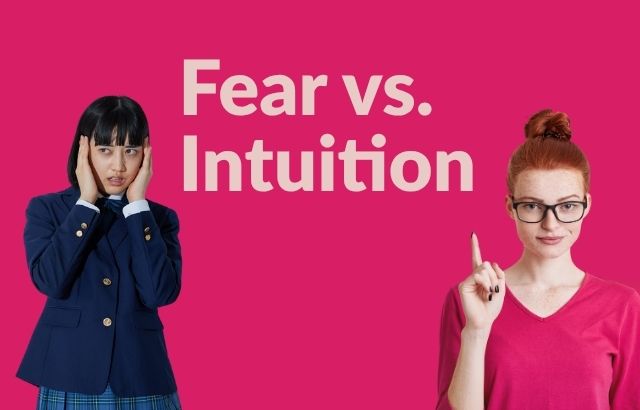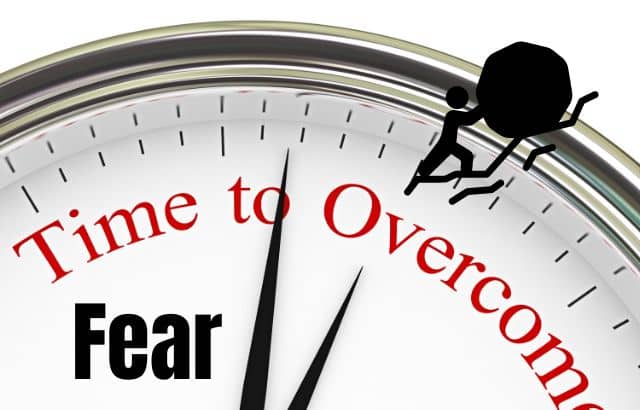Fear and intuition are two distinct, yet interconnected, aspects of human cognition that influence the decisions we make daily. Understanding these two forces and how to differentiate between them can significantly impact your path to success.
Table of Contents
Understanding Fear and Intuition
Fear
Fear is an emotional response triggered by the perception of a threat or danger. It’s an instinctive reaction aimed at protecting us from harm. Fear can be useful in situations requiring caution or when immediate action is needed to avoid danger. However, in non-life-threatening scenarios, fear can become a limiting factor, preventing us from taking necessary risks, exploring new opportunities, or pushing our boundaries.
Characteristics of Fear:
- Emotional distress: It often arises in response to potential negative outcomes or past negative experiences.
- Negative focus: Fear often leads to pessimistic thinking, dwelling on worst-case scenarios.
- Limiting beliefs: Fear tends to keep us stuck, preventing growth and exploration.
Intuition
Intuition, often referred to as a “gut feeling” or “inner voice,” is the ability to understand something instinctively, without the need for conscious reasoning. Intuition draws upon past experiences, knowledge, and subconscious signals to help us make quick and effective decisions.
Characteristics of Intuition:
- Calm and centered: Intuition arises in a calm, centered state and provides clarity, often without the need for excessive analysis.
- Neutral or positive inclination: It tends to guide us toward possibilities and opportunities, rather than limiting us.
- Aligned with values: Intuition helps us make decisions that align with our authentic self, values, and long-term goals.
Fear vs. Intuition: Key Differences
- Emotional vs. Calm:
- Fear is often associated with emotional distress and anxiety.
- Intuition tends to be calm and centered, even in uncertain situations.
- Negative vs. Neutral/Positive:
- Fear focuses on potential negative outcomes.
- Intuition is often neutral or positive, opening up possibilities.
- Past vs. Present:
- Fear tends to be rooted in past experiences or future projections.
- Intuition is grounded in the present moment, drawing from subconscious knowledge and patterns.
- Limiting vs. Expansive:
- Fear limits possibilities and hinders growth.
- Intuition expands our perspective and opens up new opportunities.
Making Decisions: How to Differentiate Between Fear and Intuition
When faced with a decision, differentiating between fear and intuition is key. Here’s a practical approach:
1. Assess Fear:
- Reflect on whether your fear is based on rational concerns or limiting beliefs. If the fear is rooted in past experiences, it may be holding you back unnecessarily.
2. Listen to Intuition:
- Pay attention to your “gut feelings” when making decisions. If a choice aligns with your values, goals, and authentic self, it’s likely your intuition guiding you toward it.
3. Balance and Integration:
- Balance rational analysis with intuitive insights. While intuition can provide valuable guidance, combining it with logical reasoning ensures more informed and balanced decisions.
Hirav Shah’s Approach to Fear and Intuition
Hirav Shah, a renowned business strategist and astrologer, emphasizes the importance of cultivating self-awareness and mindfulness when distinguishing between fear and intuition. According to Shah, understanding your gut reactions is vital for making decisions that align with your long-term goals.
Shah shares a simple method to tap into your body’s wisdom to discern between fear and intuition:
A Simple Body Check:
- Position Yourself Comfortably: Sit or stand in a relaxed posture.
- Breathe Deeply: Close your eyes, take three deep breaths, and allow your mind to settle.
- Ask Yourself the Key Question: “Does saying yes to this make me feel expansive or contracted?”
- Expansive feelings (e.g., a sense of joy, excitement, or energy) indicate intuition guiding you forward.
- Contracted feelings (e.g., fear, hesitation, or unease) signal that you should reconsider the decision.
Shah stresses that understanding your gut reaction is not about thinking logically or rationalizing the situation; it’s about tuning into your body’s nonverbal cues. Over time, this practice will help you better trust your intuition.
Practical Examples of Fear vs. Intuition
- Example of Fear:
- Scenario: You’re presented with a job offer that’s a step up in your career, but it requires relocating to a new city.
- Fear Response: You feel a sense of anxiety, thinking about leaving your current comfort zone, and worry about the unknown. Your mind begins to dwell on potential failures or missed opportunities.
- What it tells you: The fear might be related to uncertainty and past experiences where change brought challenges. It might be limiting you from taking the next step in your career.
- Example of Intuition:
- Scenario: You’re thinking about starting a new business venture in an industry you’ve always been passionate about, but you’ve never worked in this field before.
- Intuition Response: You feel a sense of excitement, energy, and a strong pull toward pursuing the idea. You don’t have all the answers, but something deep within tells you it’s the right path.
- What it tells you: Your intuition is guiding you toward something that aligns with your values and long-term goals. You may not have all the details yet, but the path feels right.
Role of a Business Strategist in Decision-Making
Business strategists like Hirav Shah play a crucial role in helping clients navigate the complexities of business decisions by balancing both intuition and analysis. They combine intuitive insights with logical reasoning and market analysis to guide businesses toward success.
- Example: A strategist may use market research and financial projections to assess the viability of a new product while also consulting their intuition to gauge whether the product aligns with the company’s values and long-term goals.
- Calculated Risk-Taking: A business strategist encourages embracing calculated risks, drawing on both intuition and analysis to determine when it’s the right time to leap.
Frequently Asked Questions (FAQs)
1. How do I know if it’s fear or intuition?
- Answer: Fear often feels constricting, anxiety-driven, and tied to past experiences or imagined future risks. Intuition, on the other hand, feels expansive, calm, and in alignment with your true self and values.
2. Can intuition be wrong?
- Answer: While intuition is generally reliable, it can sometimes be clouded by unresolved emotions or biases. It’s important to balance intuition with rational analysis for well-rounded decision-making.
3. How can I develop my intuition?
- Answer: Practice mindfulness and self-awareness. Pay attention to your body’s signals, reflect on past experiences, and meditate regularly to strengthen your connection with your intuition.
4. Should I always follow my intuition in business?
- Answer: While intuition can be a powerful tool, it’s crucial to balance it with logical analysis, data, and expert advice, especially in business decisions. Successful entrepreneurs like Hirav Shah rely on a combination of both.
5. How can I overcome fear and take risks?
- Answer: To overcome fear, assess whether it’s based on rational concerns or limiting beliefs. Challenge those beliefs by gradually stepping out of your comfort zone. Take small risks and build confidence over time.
Conclusion: Fear and Intuition for Success
Understanding when to listen to fear and when to trust your intuition is essential for making decisions that lead to personal and professional success. By evaluating your gut reactions, balancing them with logical analysis, and developing your intuition, you can navigate through challenges and seize opportunities for growth.
According to Hirav Shah, success often involves stepping outside your comfort zone, confronting fear, and embracing intuition. With the right mindset, self-awareness, and guidance, you can make decisions that align with your highest potential and goals.
Similarly, revitalizing your workday and making mundane tasks exciting ties into this balance of fear and intuition. Often, fear of monotony or lack of inspiration can make daily work feel draining. However, embracing intuitive insights to transform how you approach these tasks can unlock new levels of energy, creativity, and productivity.
By infusing excitement into routine activities—whether through gamification, rewarding milestones, or tapping into creativity—you can reinvigorate your workday and stay engaged with both your tasks and personal growth. Much like how fear can be a signal for growth and intuition can guide us to opportunities, applying this mindset to the most mundane aspects of your day can ultimately lead to greater satisfaction and success.
So, when faced with everyday challenges, remember: trust your intuition, embrace discomfort as a path to growth, and revitalize the ordinary to align with your bigger goals. Whether navigating the complexities of fear or transforming your workday, success is within your control.


















